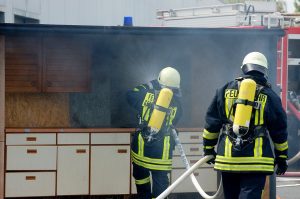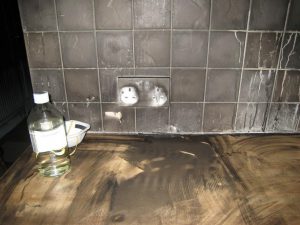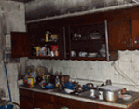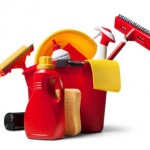There’s nothing like having a home-cooked meal with your family and friends. Certainly, using the oven or stove provides healthier dinner options than the microwave, not to mention it tasting better. However, there are many risks associated with stove and oven cooking. If the cooking food is left alone at any point in time, there is always the possibility of risking what is called a protein fire.
Protein fires occur whenever food burns, such as eggs, meats, or any other form of protein. Although it is not as commonly known, due to the fact that it does not always produce large or dark smoke. On the other hand, it can still cause significant damage to your household belongings and property structure.
Although you may not be able to see any dark smoke or soot residue that is usually produced by a large fire, it is important to remember that simply wiping down the affected area will not effectively remove the damage. If this does happen, you may notice a strong, burnt food smell that is left behind. This is the key indicator that the damage is still present.
 Removing Cooking Grease Odors and Protein Fire Damage
Removing Cooking Grease Odors and Protein Fire Damage
If you have burned the food on the stove, you must get rid of the odor as quickly as possible. This is because it will spread throughout the home, seeping through the walls, furniture, and surrounding areas of your kitchen. Ultimately, the more time that it is given to spread, the more difficult it will be to have it all removed. You may not even notice the odor until long after the protein fire has occurred.
In addition, a protein fire will leave all affected surfaces covered in cooking grease that can be difficult to remove if the wrong cleaning products and techniques are used. While removing this sticky residue can be tricky, it is still possible to clean and even remove the foul odor that was left behind.
How to Remove Cooking Grease from a Protein Fire
- Cover all of the flooring in the kitchen with old towels or plastic to prevent additional damage from occurring.
- Combine two tablespoons of vinegar, one tablespoon of dishwashing soap, and one quart of warm water in a bucket.
- Dip a sponge or mop into the sanitizing solution and remove all excess solution.
- Use the mop or sponge for all affected building materials, including the countertops, walls, ceilings, and cabinets. Use a back-and-forth motion and repeat steps two and three as required. For tough spots and stains, use a thicker scrub brush. Although this procedure may take time to remove all spots, it must be cleaned in order to prevent the spread of all odors throughout the property.
- After scrubbing, rinse the sponge and scrub brush with warm water. Dispose of the rest of the cleaning solution and fill the bucket again with warm, clean water.
- Gently wipe away any residue left behind by the cleaning solution using the clean sponge and warm water.
 Remove the towels and plastic from your floors and repeat steps two through four.
Remove the towels and plastic from your floors and repeat steps two through four.- Dry all affected materials and turn on the HVAC system to increase air circulation throughout the property.
If for any reason, you are not able to remove all of the stains, you can always try covering them with paint. However, this should not be done if there are still protein odors lingering on the property. To have them effectively removed, be sure to call the fire and smoke damage restoration professionals. They are also able to provide odor removal services if you are not able to effectively remove them yourself.
Preventing Protein Fires
While it can seem time-consuming and a lot of work to remove the smoke residue caused by a protein fire, there are ways that it can be prevented in the future. In order to be prepared, always monitor the food and cooking equipment when cooking in the kitchen. You will also want to keep a fire extinguisher where it can be easily accessed in case of an emergency. For minor grease splatters, you can use a stovetop platter guard to prevent the grease from sticking to the counters, walls, and ceiling.
Call the Professionals
In case you do experience a fire in your kitchen, do not hesitate to call the fire department right away. Afterwards, contact an emergency fire damage cleanup provider that is available 24/7. ServiceMaster is one of the nation’s leading providers, arriving in emergency situations to prevent the spread of damage and restore all affected surfaces to their original conditions. Contact your local provider today to see how they can help you when the unexpected occurs.
 Removing Cooking Grease Odors and Protein Fire Damage
Removing Cooking Grease Odors and Protein Fire Damage Remove the towels and plastic from your floors and repeat steps two through four.
Remove the towels and plastic from your floors and repeat steps two through four.



